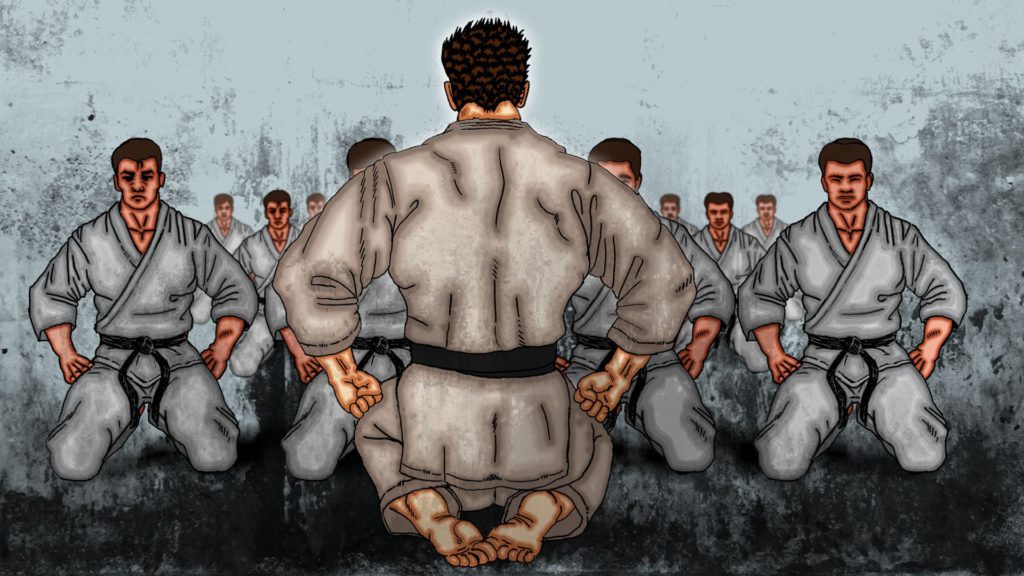“Seiza”! Again, we step back and down into kneeling position. Fist at our hips.
“Fudō-dachi!” Sensei calls again. We all get back up with “Osu!”
Again and again we repeat. Eventually, Sensei explains to us that he is correcting our dojo etiquette. We should all be moving as one, with the same precision, and the same energy.
He tells is how important it is that we learn about the manners and etiquette of karate. This attendance to tradition, etiquette, along with karate kata etc, is what differentiates us from sports.
Sensei explains that when we bow or observe special moments, or ceremonies, we do so for the purpose of training our mind, spirit and to supplement the training of our bodies.
Some of the major components of dojo etiquette include “OSU”. Which we say when we enter the dojo, leave a dojo, when we step onto or off the training floor, when we meet other students or instructors, when class begins and ends, and when we begin training with our partner. In response to instruction, to acknowledge we understand, and also to focus our minds to the present. Osu!
We bow to remind ourselves to be grateful to those who developed the Karate we study. We are grateful to have a place to study and people with whom to study. We bow to thank our teacher and fellow students.
So we each go through the steps of sitting down into seiza, like we are breaking down a kata. Stepping back with the left foot and lower our left knee to the floor, etc., until we are all moving as one.
Sensei also explains that we must do this with intent and presence. We can’t just go through movements for the sake of the moves. We can’t look “lazy”. Instead it should be a focused crisp movement. Like kata.
It is important, he tells us, that we take this seriously and give it the respect it deserves. Unlike other sports, including Kickboxing, Kyokushin Karate follows Japanese dojo customs, and we need to give them the respect they deserve. As well, by concentrating on these aspects of karate, it will train our minds to the finer points of etiquette and the finer points of our own movements. This can translate to outside of the dojo, for example in our work, where it can help us be more organized, mindful of what we do, and to be one with our actions.
Like most training Sensei shows how what we are learning is applicable to life.
Finally satisfied with how we are moving into seiza, Sensei motions to Senpai, who calls “Sensei ni rei” (bow to the instructor). Facing the front of the dojo, bow (rei) at the waist placing first your left fist and then our right on the floor in front of us. Keeping our backs straight and avoid raising our hips. After a short pause, we raise ourselves back to the seiza position, retracting first our right fist and then our left, placing our fists on our thighs. This lets Sensei know that we are eager and ready to practice. Osu!
The rest of the class was very focused on kicking basics. We are preparing for testing and were being drilled for stamina, technique and spirit. We drill on stances, and make sure, like the other aspects, that we are doing so with strong determination and focus. Even if we are in fudō-dachi, we must be focused and ready. A very tough class, as usual, but so very satisfying.
A similar routine as the opening happens at the end of class. We are kneeling in seiza. Sensei reiterates some of the points from the night, talks about the upcoming testing and speaks of how proud he is of us. It doesn’t take champions to make a great dojo. It takes a dojo of people who embody etiquette, humbleness, honesty, politeness, people good of character, etc., which he feels he has in all of us.
I sit in seiza with pride welling within me. I am proud of my teacher, my dojo, my karate style, my fellow students… and I am proud of me.
Once Sensei dismisses the class, we bow to each other and thank each other for the training, with a strong “Osu!” Which says it all.
OSU!



